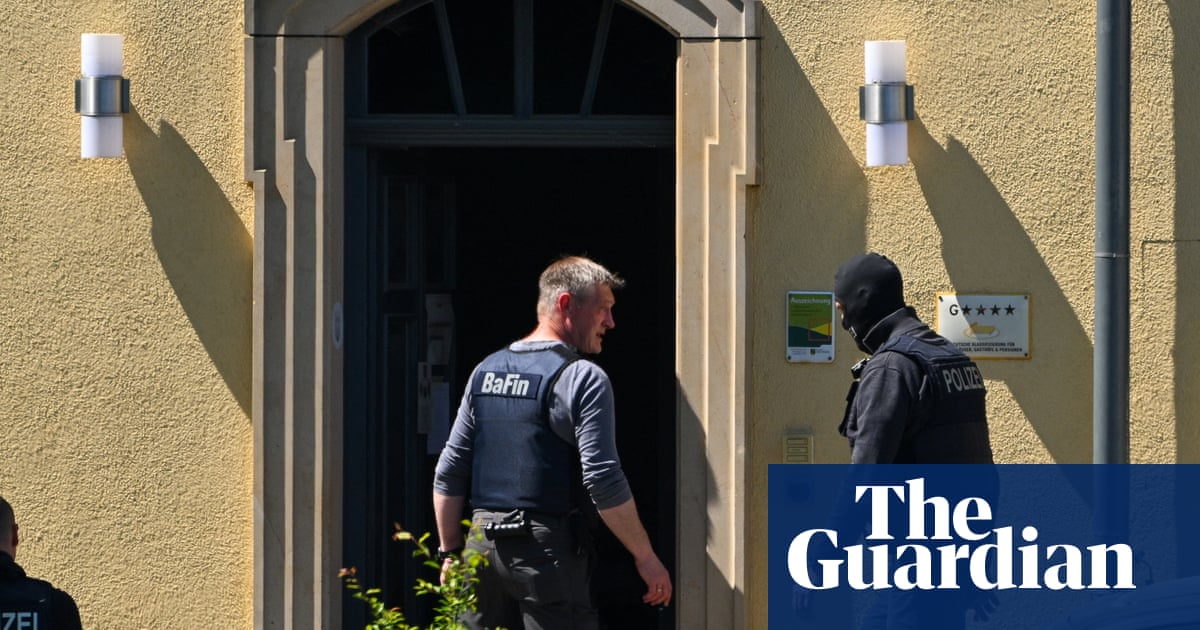The German government has outlawed a major part of an extremist movement seeking to undermine the state, in a move the new administration said signalled tough action against a subversive far-right scene.
Hundreds of security forces across seven states staged early morning raids on Tuesday against the cult-like group calling itself “Kingdom of Germany” (KRD), a large group within theReichsbürger(Citizens of the Reich) movement. Four suspects were arrested including alleged ringleader Peter Fitzek, the self-proclaimed Peter I.
“This is illegal and unlawful,” Fitzek told Spiegel TV as he was led away in handcuffs.
The interior minister, Alexander Dobrindt, said the KRD, which estimates it has 6,000 members, had created a “counter-state” inGermanyand established “criminal economic structures” that challenged the rule of law and the justice system.
“They underpin their supposed claim to power with antisemitic conspiracy narratives,” Dobrindt, whotook office last week as part of a new coalition government, said in a statement.
“We will take decisive action against those who attack our free democratic basic order.”
“We are stepping up security in our country,” the chancellor, Friedrich Merz, posted on X. “That includes taking action against those who try to fight internally against our constitution.”
The order to ban the group was made just before the raids, the ministry said, calling the KRD “the biggest association in the growing scene” of radicals rejecting the federal republic. The state ban means its online presence will be blocked and its assets confiscated.
The Reichsbürger believe the German state is an illegitimate construct and seek to re-establish a monarchy they say endured despite its formal abolition after the first world war.
The group, which bears significant similarities to theUS-based QAnon conspiracy movement, does not recognise institutions including parliament or the courts and its followers refuse to pay taxes, social welfare contributions or fines.
Fitzek founded the KRD in the eastern town of Wittenberg in 2012 and proclaimed himself the “highest sovereign” of the new “kingdom”, the ministry said.
Beyond Fitzek, a high-profile figure who has given media interviews, federal prosecutors named those arrested on Tuesday only as Mathias B, Benjamin M and Martin S, in line with privacy rules.
The four suspects are alleged by prosecutors to have over the last decade set up a bank, a health insurance and pension scheme, identity papers and a separate currency.
Germany’s domestic intelligence service, the Office for the Protection of the Constitution (BfV), put the Reichsbürger under observation in 2016, after one of its members shot dead a police officer during a raid at his home.
The movement came to light for most Germans in December 2022 when authorities swooped on several of its leaders who they said were in the advanced stages of planning an armed coup.
The eclectic movement wasled by a minor aristocrat and businessman, Heinrich XIII Prince Reuss.
In March this year,a German court jailed five members of an extremist group linked to the Reichsbürgerfor plotting a coup and planning to kidnap the then health minister, Karl Lauterbach, who drew the ire of many opponents of Covid-era restrictions.
It was one of several trials targeting the wider movement.
German authorities have recently stepped up action against groups seen as a threat to the democratic order.
TheBfV earlier this month declared the Alternative für Deutschland, the country’s biggest opposition party, to be a “confirmed rightwing extremist” force. Pending a court challenge, the designation would allow stepped-up surveillance of AfD officials, while the announcement has lent momentum to calls for an outright ban of the party.
